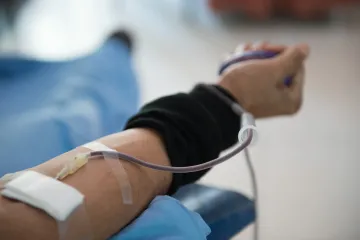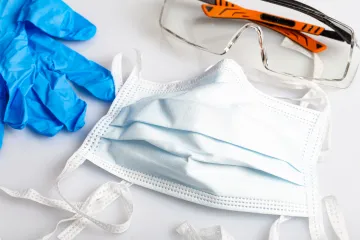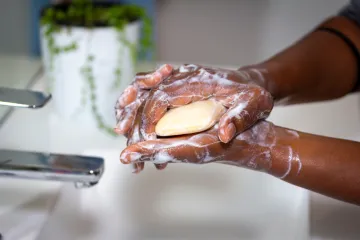4 Helpful Ways to Support Healthcare Workers During the COVID-19 Pandemic

An unprecedented experience, the COVID-19 outbreak has reminded many of us what’s most important in life: human connection. During this time of uncertainty, you may be wondering how you can give back and help prevent the pandemic from continuing to spread, especially given much of the conflicting information going around regarding the virus.
While you might not be able to help by treating patients directly, you can certainly support those who do: your community’s doctors, nurses, advance practice providers, first responders, and other healthcare workers. These individuals are bravely working daily to stop the spread of coronavirus and ensure that we remain as healthy as possible.
There are many ways you can support healthcare workers during this time, so anyone can find a way to give back based on their unique skills and resources. Here are a few ideas.

Donate Blood
The closing of schools, offices, and other community hubs has resulted in many blood drives being cancelled. The lack of blood drives, one of the primary sources of donations for blood banks, has led to a critical shortage of blood needed to help those who suffer from blood disorders, cancer, trauma, and a host of other medical conditions.
If you are feeling well and are relatively healthy (you can check your eligibility here), one of the best ways you can give back is by giving blood. Wondering about social distancing guidelines? Don’t worry; giving blood is perfectly safe. The American Red Cross and other organizations are making it their utmost priority to do everything they can to minimize your risk of getting sick. Get more details at: https://www.redcrossblood.org/donate-blood/dlp/coronavirus--covid-19--and-blood-donation.html.
If you are willing and able to donate, it is highly recommended you make an appointment first at this time.
Give PPE
Healthcare workers are directly interacting with COVID-19 patients, making them a high-risk population. Wearing personal protective equipment (PPE) such as N95 masks, gloves, and gowns reduces their chances of contracting the virus.
As more coronavirus cases emerge and more people need medical attention, PPE becomes an increasingly valuable resource. If you have access to any extra supplies, it is highly encouraged you donate them to your local hospital or medical center.
Most places will gladly accept:

- Disposable face masks
- N95 masks (sometimes known as respirators)
- Eye protection (face shields and safety goggles)
- Disposable gowns
- Disposable gloves (especially non-latex)
- Disposable surgical caps
- Disposable foot covers
- Wipes: bleach or antimicrobial
- Hand sanitizer
If you‘re in the Tucson area, we are currently accepting PPE donations at Banner Home Health. Donations are being accepted Monday Friday from 10AM 2PM. You also have the option to make a monetary donation to Banner’s Coronavirus: COVID-19 Relief Fund, a portion of which goes to fund PPE for healthcare professionals on the frontline.
Not in Tucson? There are many PPE donation drives across the country. Check out donateppe.org to find out how you can donate.

Stay Home
Perhaps the best and simplest thing you can do to support healthcare and other essential workers during this time is to follow social distancing guidelines and reduce contact with others as much as possible.
To continue spreading, the coronavirus must find human hosts. By keeping our distance from each other, we remove ourselves from potential hosts, stopping the chain of the virus spreading.
Current social distancing guidelines suspend all nonessential business and limit the number of individuals at any gathering to no more than 5 people. When it is necessary to be around people, the CDC recommends keeping a distance of at least 6 feet. The guidelines are changing regularly, so make sure you‘re checking them often and staying up-to-date: https://www.cdc.gov/coronavirus/2019-ncov/community/index.html.
Humans are social creatures, and understandably, staying at home for such a prolonged period can make us antsy. But if we take the guidelines seriously and follow them now, we'll minimize the length and impact of this pandemic and avoid overwhelming our healthcare system.
Do the Little Things

While you‘re staying at home and practicing social distancing, there are a few simple things you can do every day to reduce your risk of getting sick:
- Wash your hands regularly and thoroughly, especially after contact with others or touching your face. This diagram from the World Health Organization demonstrates the correct way to wash your hands.
- Cough into your elbow or a tissue, not your hand.
- Avoid touching your face, especially your eyes, nose, and mouth.
- Eat a healthy, well-balanced diet.
- Get plenty of rest.
- Stay on top of your physical health with home workouts. The Peloton app is currently offering a free 90-day trial.
- Make sure you‘re still getting your social time in! Virtual happy hours, meet-ups, and games are all fun ways to connect with your friends and family from afar.
The most important thing to remember through this challenging time is that we‘re all in this together. Our healthcare workers are on the frontlines taking care of us; it’s our public duty to take care of them from behind the scenes. Consider doing whatever you can, even if it’s simply staying home and refraining from that social gathering you were considering. If we stick together and do what we can to help each other out, we'll come out of this faster, stronger, and more connected.
Taylor S. Riall, MD, PhD, FACS, is a professor and interim chair of the University of Arizona Department of Surgery.

